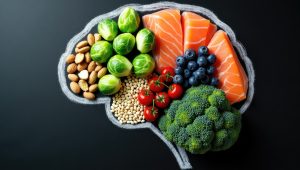The Connection Between Nutrition and Memory: How Food Affects Cognitive Function
Memory is a complex and multifaceted cognitive function that plays a vital role in our daily lives. From remembering important events and appointments to recalling learned skills and knowledge, memory is essential for our overall well-being and success. While genetics and lifestyle factors can influence memory, a growing body of research suggests that nutrition also plays a significant role in cognitive function and memory.
The Importance of Nutrition for Memory
A well-balanced diet that includes a variety of whole foods, such as fruits, vegetables, whole grains, lean proteins, and healthy fats, provides the necessary nutrients and building blocks for optimal brain function. The brain is a hungry organ, accounting for approximately 20% of the body’s total energy expenditure. Adequate nutrition is essential for maintaining healthy brain cells, facilitating communication between neurons, and supporting the growth and development of new neural connections.
Key Nutrients for Memory
Several nutrients have been identified as essential for supporting memory and cognitive function. These include:
- Omega-3 fatty acids: These healthy fats, particularly EPA and DHA, are found in fatty fish, nuts, and seeds. Omega-3s support brain cell membrane structure and function, promoting healthy communication between neurons.
- Vitamin D: This essential vitamin is obtained through sun exposure, dietary sources, and supplements. Vitamin D receptors are found in brain cells, and research suggests that vitamin D plays a role in regulating neurotransmitter function and protecting against age-related cognitive decline.
- B Vitamins: B vitamins, particularly B6, B9 (folate), and B12, are essential for synthesizing neurotransmitters and maintaining healthy brain cells. Foods rich in B vitamins include leafy greens, legumes, whole grains, and lean meats.
- Antioxidants: Antioxidants, such as vitamins C and E, and polyphenols found in fruits, vegetables, and tea, help protect brain cells from oxidative stress and inflammation, which can damage memory and cognitive function.
- Magnesium: This essential mineral supports neuronal function and synaptic plasticity, facilitating learning and memory. Foods rich in magnesium include dark leafy greens, nuts, and whole grains.
Dietary Patterns Associated with Better Memory
Research has identified several dietary patterns that are associated with improved memory and cognitive function. These include:
- Mediterranean diet: Characterized by high intake of fruits, vegetables, whole grains, lean proteins, and healthy fats, the Mediterranean diet has been shown to support cognitive function and reduce the risk of age-related cognitive decline.
- DASH diet: The DASH (Dietary Approaches to Stop Hypertension) diet, developed to reduce blood pressure, emphasizes whole grains, fruits, vegetables, lean proteins, and low-fat dairy products.
- Plant-based diet: A diet rich in plant-based foods, including fruits, vegetables, legumes, and whole grains, has been associated with improved cognitive function and a reduced risk of age-related cognitive decline.
Tips for Supporting Memory through Nutrition
- Eat a balanced diet: Focus on whole, unprocessed foods, including fruits, vegetables, whole grains, lean proteins, and healthy fats.
- Stay hydrated: Adequate hydration is essential for maintaining cognitive function and supporting memory.
- Limit processed and sugary foods: These foods can lead to inflammation and oxidative stress, which can damage brain cells and impair memory.
- Consider supplements: If you’re concerned about getting enough nutrients through diet alone, consider consulting with a healthcare professional about supplementing with omega-3s, vitamin D, and other essential nutrients.
Conclusion
While genetics and lifestyle factors can influence memory, nutrition plays a critical role in supporting cognitive function and memory. By incorporating a balanced diet rich in whole foods, essential nutrients, and healthy fats, you can support optimal brain function and reduce the risk of age-related cognitive decline.
References:
During the preparation of this work the author used the AI tool, NaviGator. After using this tool/service, the author reviewed and edited the content as needed and takes full responsibility for the content of the publication. Image source: Adobe Stock
- Nutrition and Memory - August 1, 2025
- Exercise Boosts Brain Power - July 1, 2025
- Chronic Inflammation and Dietary Habits - April 2, 2025

